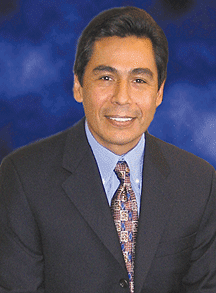The Beginning Of The Trend
In Sync With Steven Primo
by Jayanthi Gopalakrishnan

Are you trading according to your trading personality? Steven Primo can give you a clue about that. A nearly 30-year Wall Street veteran, Primo is the director of education for TradingMarkets. Currently, he also heads a private investment partnership where he is general partner and head trader. Previously, Primo was a nine-year specialist for Donaldson, Lufkin and Jenerette (DLJ), one of the premier investment firms on Wall Street. STOCKS & COMMODITIES Editor Jayanthi Gopalakrishnan interviewd Steven Primo on April 12, 2007, by telephone.
When I was on the floor I was just a contrarian for contrarians' sake, and there was no plan. Then I realized the importance of having one.
Steve, how did you get involved in trading?
That's a funny story. I don't have any background in finance. In fact, I graduated from Loyola University with a degree in music. But my father was a stockbroker. He was always trying to get me involved in the markets, but I had no interest in the subject. The summer I graduated from college, I was in downtown Los Angeles looking to buy a cheap saxophone, and I saw the Pacific Stock Exchange. I thought, "My dad always talked about this place!" So I went up to the visitors' gallery and saw the paper on the floor and all the people screaming and making hand signals -- and I was hooked. So I got a haircut and applied for a job the next day.
When was this?
The summer of 1977. I got hired as a runner, where you stood in front of the specialist and literally wrote down all the trades on a piece of paper and once a trade occurred, you wrote down the share size, the name of the stock and the price, and then took it over to the teletype operator and she put it up on the tape. I started out doing that and seven years later I became a specialist for Donaldson, Lufkin and Jenrette (DLJ).
How long were you there?
I was on the floor of the PSE for a total of 16 years, but I was a specialist for nine, until I left in 1994. I tell this story to my students because a lot of them start out thinking they need a business or financial degree to trade or have to know all about companies and have a business sense. You don't. I started not knowing a thing. I was down there for 16 years. So that is how I got started trading. It was just supposed to be a summer job.
What was so exciting about it?
Since I traded from 1977 to 1994, I think the most exciting part was the crash of 1987. I came home from Europe the day before the crash. My style of trading -- I was a contrarian -- was to always buy when everyone was selling, and sell short when everyone was buying. I told all the other specialists and the floor traders I was going to buy. And they said, "No. You haven't been here. This is worse than you think."
So what did you do?
On the day of the crash, the market was down about 250 points and it was falling out of bed. I started to buy. Lo and behold the market did rally. A lot of people don't remember, but there were these intraday swings, and it rallied. It was only down 100 points, and so I sold everything I had bought, and in about an hour I made about $100,000. I thought, "Wow! This is like free money!" So when the markets started to sell off again, I started to buy again -- and we all know what happened.
Didn't go quite the way you thought it would?
By the end of the day I had not only lost the $100,000 I had made but I also lost an extra $250,000. A lot of floor traders lost millions, and this was in 1987.
It taught me a valuable lesson, and this is what I teach my students. Would-be traders come into the markets, whether it is to trade stocks, commodities, or futures, looking at the market as if it is something to battle with. If you look at it that way, that is what you are going to get -- a series of battles.
After that I thought it was easier to view the market as if it were some type of river: something to go with, or swim downstream with. Not something to swim upstream with. It is easier if you have that philosophy rather than trying to go against the market.
You'll hear people say, "I made a killing in the market" or "I got beat
up today" or even "I outsmarted the market." I don't look at the market
like that. I teach my students it is not something to battle with, but
something to be in sync with.
...Continued in the June 2007 issue of Technical Analysis
of STOCKS & COMMODITIES
Excerpted from an article originally published in the
June 2006 issue of Technical Analysis of STOCKS & COMMODITIES magazine.
All rights reserved. © Copyright 2006, Technical Analysis, Inc.
Return to June 2007 Contents